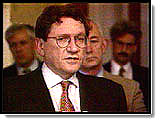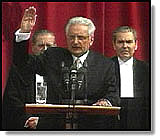
|
US Sends Dayton Author to BosniaThe United States is sending the man who brokered the Dayton peace accord for Bosnia - Richard Holbrooke - back to the region to try to keep the reconciliation process going. Separately, the United Nations refugee agency, UNHCR, has sent an official to the Bosnian town of Jajce, seeking assurances that Muslim refugees will be able to return to their homes without further harassment. On Sunday, Croation crowds forced about 300 Bosnian Muslims, who had tried to return, to leave the area. Nominally the two communities are allied in the Croat-Muslim Federation, and one of Mr Holbrooke's goals is to get Bosnia's president, Alija Izetbegovic, and the Croatian president, Franjo Tudjman, to co-operate more closely. The two leaders are due to meet on Wednesday at the Adriatic port of Split.
The American envoy will also be meeting Serbia's President Milosevic. The US regards him as the worst culprit in failing to meet the terms of the Dayton Agreement. In particular, it is unhappy at the revival in the fortunes of the Bosnian Serb, Radovan Karadzic - wanted by the UN's war crimes tribunal in The Hague. Complicating matters, a row has developed over the performance of the international mediator in the former Yugoslavia, Carlos Westendorp. The US has taken issue with his formula for dividing Bosnia's ambassadorships between the communities. The United States criticised Mr Westendorp's handling of events - and Mr Westendorp's spokesman responded by saying it was a shame the US had chosen such a sensitive time to make its derogatory remarks.
The UNHCR says the events of the weekend reveal a problem which exists throughout Bosnia Hercegovina. It estimates that 800,000 displaced people and 700,000 refugees are still waiting to go back to their homes. But the vast majority of these people used to live in an area now controlled by one of their former enemies. The UNHCR says refugees from areas where their own ethnic group is in the majority have already returned successfully. So it believes the process of returning people to their homes will become increasingly difficult - but is vital if the Dayton peace process is to survive. The problem is especially acute in the territory controlled by the Bosnian Serbs, where only 1,200-1,500 Bosnian Muslims and Bosnian Croats have been able to go home since the signing of the Dayton accords. In an attempt to encourage the process, the UNHCR has launched an initiative called 'open cities'. Under the scheme, cities or municipalities which declare a willingness to welcome back people from an ethnic minority will be given substantial and rapid international assistance.
The BBC does not endorse the content of external sites
|
Diana, Princess of Wales, 1961-1997
Conference 97
Devolution
The Archive
News |
Issues |
Background |
Parties |
Analysis |
TV/Radio/Web
Interactive |
Forum |
Live |
About This Site
News |
Issues |
Background |
Parties |
Analysis |
TV/Radio/Web
Interactive |
Forum |
Live |
About This Site
© BBC 1997 |
politics97@bbc.co.uk |

